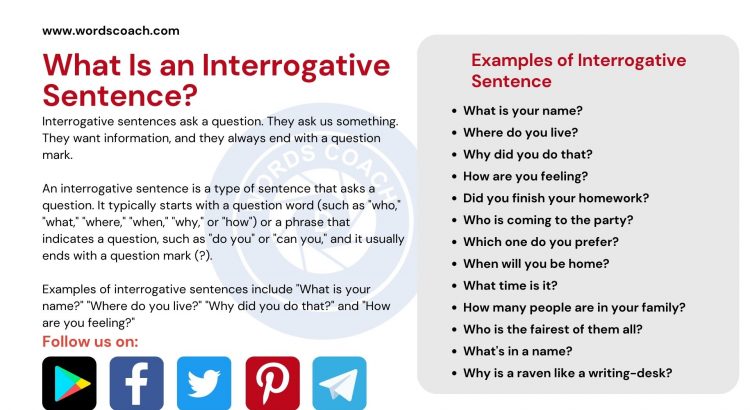What Is an Interrogative Sentence?
Interrogative sentences ask a question. They ask us something. They want information, and they always end with a question mark.
An interrogative sentence is a type of sentence that asks a question. It typically starts with a question word (such as “who,” “what,” “where,” “when,” “why,” or “how”) or a phrase that indicates a question, such as “do you” or “can you,” and it usually ends with a question mark (?).
Examples of interrogative sentences include “What is your name?” “Where do you live?” “Why did you do that?” and “How are you feeling?”
The usual word order for the interrogative sentence is:
(wh-word +) auxiliary + subject + verb…
Interrogative sentences can be used to gather information, to request clarification, to show interest or to express a doubt. They can also be used in literature to create suspense or to reveal a character’s thoughts and feelings.
Interrogative sentences can be divided into several types such as, yes-no questions, wh-questions, tag questions, and choice questions. Each of them is used for different purposes and asking different kind of information.

Types of Interrogative Sentences
There are several types of interrogative sentences:
- Yes-no questions: These are questions that can be answered with “yes” or “no,” such as “Are you feeling okay?”
- Wh-questions: These are questions that start with a question word, such as “what,” “when,” “where,” “who,” “whom,” “whose,” “which,” or “why,” and are used to gather specific information, such as “What is your name?” or “Where are you going?”
- Tag questions: These are short questions added at the end of a statement, usually in the form of “isn’t it?” “aren’t they?” “don’t you?” etc. , they are used to confirm or ask for confirmation, such as “It’s a nice day, isn’t it?”
- Choice questions: These are questions that are used to provide a choice or options, such as “Which one do you prefer?” or “What would you like to have for dinner?”
- Leading questions: These are questions that are worded in a way that suggests a certain answer, and are used to manipulate or influence the answer.
- Rhetorical questions: These are questions that are asked for emphasis or effect, without expecting a response, such as “Why do we even bother?”
In literature, interrogative sentences are used to create suspense and to reveal the thoughts and feelings of the characters.
Each type of interrogative sentence serves a specific purpose and is used to gather different types of information. It’s important to note that the way a question is worded can affect the answer received, so careful consideration should be given when formulating an interrogative sentence.
Points to Remember When Using Interrogative Sentences
When using interrogative sentences, it’s important to keep the following points in mind:
- Be clear and specific: Use specific language and avoid ambiguity to ensure that the question is understood correctly.
- Use the appropriate question word: Use the correct question word to gather the information you need, such as “who” for people, “what” for things, “when” for time, and “why” for reasons.
- Keep the tone appropriate: Use a polite and respectful tone when asking questions, especially when asking personal or sensitive information.
- Use correct grammar: Make sure to use proper subject-verb agreement and word order when constructing your question.
- Be open-minded: Be prepared to receive any answer and be willing to consider different perspectives and opinions.
- Avoid leading questions: Be careful not to phrase a question in a way that suggests a certain answer, as this can be manipulative and can affect the validity of the information received.
- Rhetorical questions: Use rhetorical questions for emphasis and effect, not for the purpose of receiving an answer.
By following these guidelines, you can ensure that your questions are clear, effective, and appropriate for the situation.
Uses of Interrogative Sentences
Interrogative sentences are used to gather information, to request clarification, and to express interest or doubt. They can also be used in literature to create suspense or to reveal a character’s thoughts and feelings.
- Gathering information: Interrogative sentences are used to gather information by asking questions about a specific topic or subject.
- Requesting clarification: Interrogative sentences are used to request clarification when something is unclear or confusing.
- Expressing interest: Interrogative sentences are used to show interest in a topic or subject by asking questions about it.
- Expressing doubt: Interrogative sentences can be used to express doubt or uncertainty by asking questions to confirm or verify information.
- Creating suspense: Interrogative sentences can be used in literature to create suspense and tension by asking questions that are not immediately answered.
- Revealing a character’s thoughts and feelings: Interrogative sentences can be used in literature to reveal a character’s thoughts and feelings by showing their internal dialogue and the questions they are asking themselves.
- In a conversation or interviews, Interrogative sentences are used to start a conversation, to ask for an opinion or to seek feedback.
- In a survey or research, Interrogative sentences are used to gather information from a sample population.
Interrogative sentences are a versatile and useful tool for gathering information, expressing interest or doubt, and creating suspense and tension. They are used in many different contexts, from everyday conversations to literature, research, and surveys.
Examples of Interrogative Sentences
- What is your name?
- Where do you live?
- Why did you do that?
- How are you feeling?
- Did you finish your homework?
- Who is coming to the party?
- Which one do you prefer?
- When will you be home?
- What time is it?
- How many people are in your family?
In literature,
- “Who is the fairest of them all?” – Snow White (Grimm brothers)
- “What’s in a name?” – Romeo and Juliet (Shakespeare)
- “Why is a raven like a writing-desk?” – Alice’s Adventures in Wonderland (Carroll)
- “How does one become a butterfly?” – The Little Prince (Saint-Exupéry)
- “Where are the snows of yesteryear?” – Les Fleurs du Mal (Baudelaire)
Read More: 40 Examples of Interrogative Sentences
As you can see, interrogative sentences can be used in many different contexts and can express a wide range of meaning depending on the words used and the way they are phrased.





